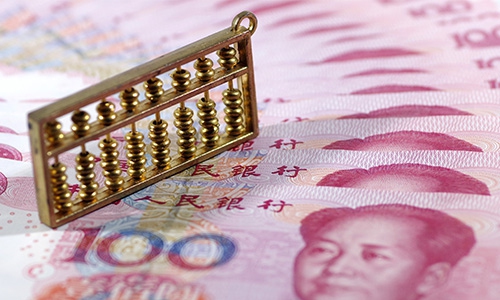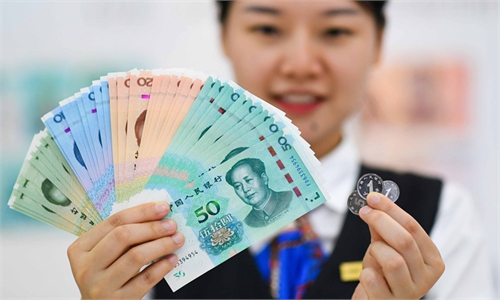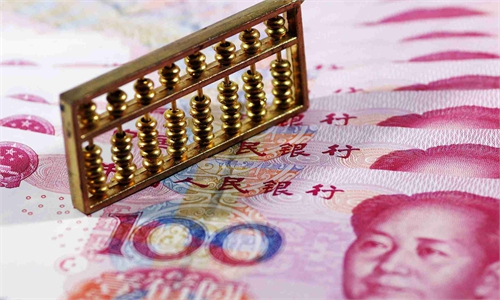Yuan’s two-way swing becomes norm, may strengthen to 6.5 against dollar in second half of 2023: analysts

Renminbi Photo: VCG
The recent appreciation of the US dollar amid broad expectations for more interest rate hikes by US Federal Reserve, has added pressure to Chinese yuan, which depreciated by about 4 percent in February.
But experts said that there is no basis for a long-term depreciation of the yuan, which will return to a reasonable level with the steady recovery of the Chinese economy.
On Monday, the onshore yuan opened at 6.9590 against the dollar and weakened to 6.9633 as of 4 pm. After appreciating for three consecutive months, the yuan's exchange rate weakened to 6.96 in February, while the offshore yuan weakened to 6.98 against the greenback.
The central parity rate of the yuan softened 630 basis points to 6.9572 against the dollar on Monday, according to the China Foreign Exchange Trade System.
On the same day, the US Dollar Index, which measures the US currency against six major peers, stood at 105.17, hitting a seven-week high.
"On the one hand, strong US economic data reinforced market expectations that the Fed will continue to hike rates to curb inflation. On the other hand, analysts revised gauges of China's economic recovery after the Chinese Lunar New Year. The two factors resulted in the depreciation of the yuan," Deng Haiqing, chief economist of AVIC Fund Management Co, told the Global Times on Monday.
But the impact of the rebound of the dollar on the yuan is limited, Deng said, noting that the yuan is expected to hover at the equilibrium level, with two-way fluctuation becoming its norm. "2023 will be a turning point for a strong dollar, as there are growing risks of a US economic recession. The Fed will probably end interest rate hikes late this year."
"The rebound of the Chinese economy in 2023 will bolster the yuan," Deng said.
Analysts with Ping An Bank Co projected in a note on the bank's WeChat account that the yuan's exchange rate may continue to fluctuate between 6.6 and 7.2 against the dollar in the first half of 2023, since there is no sign that the US Federal Reserve will suspend interest rate hikes.
However, the yuan may strengthen to 6.5 against the dollar in the second half on the back of China's economic recovery, whereas the US economy is faced with a growing risk of recession, according to the analysts.
China strives to keep the yuan's exchange rate basically stable, as a stronger yuan makes China's goods more expensive in the international market, while a weaker yuan may lead to an outbound flight of domestic assets.
A securities affairs representative of hand tools maker Hangzhou Greatstar Industrial Co told the Global Times on Tuesday that a majority of the company's overseas orders are paid in the dollar, and thus the depreciation of the yuan will increase the company's profits in the short term.
Amid two-way fluctuation of the yuan, domestic enterprises are increasingly engaged in foreign-exchange derivatives trading to hedge market risks. Since the beginning of 2023, a dozen public Chinese companies have announced relevant moves, including BYD and Ganfeng Lithium Group.
BYD announced in a filing with the Shenzhen Stock Exchange in January that it plans to conduct foreign-exchange derivatives trading with a limit of $4.3 billion or the equivalent in other foreign currencies in order to lock in costs, and hedge and prevent risks such as wide exchange rate swings.
The People's Bank of China, the central bank, said on Friday that the yuan's exchange rate will remain basically stable at a reasonable and equilibrium level.
The central bank said that it will stick to a managed floating exchange rate system based on market supply and demand, which will be adjusted with reference to a basket of currencies. The market will play a decisive role in the yuan's exchange rate, and the central bank will increase the flexibility of the yuan and stabilize expectations, according to its fourth-quarter monetary policy report.
As a tool for the management of overseas market liquidity and stabilizing expectations, the central bank issued bills worth 25 billion yuan in the Hong Kong Special Administrative Region last week.



